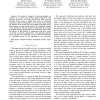Free Online Productivity Tools
i2Speak
i2Symbol
i2OCR
iTex2Img
iWeb2Print
iWeb2Shot
i2Type
iPdf2Split
iPdf2Merge
i2Bopomofo
i2Arabic
i2Style
i2Image
i2PDF
iLatex2Rtf
Sci2ools
100
click to vote
ROBIO
2006
IEEE
2006
IEEE
Sensor Based Localization for Mobile Robots by Exploration and Selection of Best Direction
Abstract— We present a strategy for resolving multiple hypotheses of a robot’s state during global localization. The strategy operates in two stages. In the first stage a unique direction of the motion is sought that resolves or eliminates maximum number of hypotheses. In the second stage, among the frontier areas arising from the multiple hypotheses states, that frontier is chosen which resolves the maximum number of the hypotheses. The two stages are alternated till a unique hypothesis emerges. Simulation and experimental results verify the efficacy of this method. A comparison with other methods based on entropy minimization, and minimum distance travel portrays the advantage of the current methodology. A convergence proof for the algorithm is also presented.
Related Content
| Added | 12 Jun 2010 |
| Updated | 12 Jun 2010 |
| Type | Conference |
| Year | 2006 |
| Where | ROBIO |
| Authors | Rakesh Goyal, K. Madhava Krishna, Shivudu Bhuvanagiri |
Comments (0)

